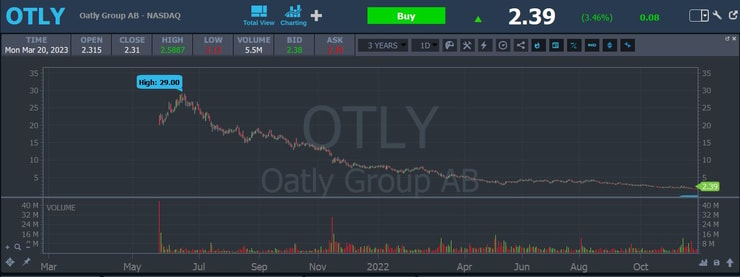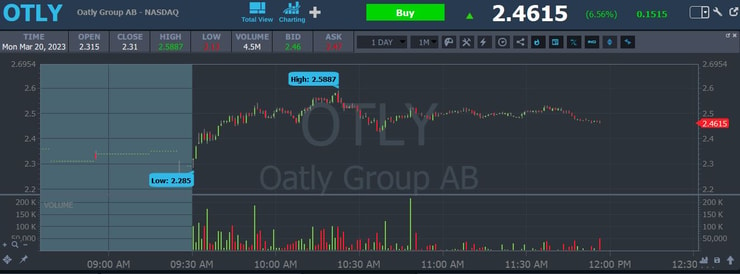AI headlines dominated the stock market over the first two months…
But over the last several weeks, the focus has shifted from AI to the banking crisis.
Market trends are constantly evolving, and it’s crucial to stay ahead as a trader.
While many fixate on the latest buzz, the most lucrative opportunities can sometimes stem from stock-specific catalysts.
In fact, I’ve found that “legitimizer-type news” can yield impressive gains, even amid broader market turbulence.
This type of catalyst trade is a personal favorite and a strategy I share with my students.
Want to learn the mechanics and discover how I recently profited?
But first, allow me to explain why I focus so much on catalysts.
Table of Contents
Why Catalysts?

2025 Millionaire Media, LLCAs traders, there’s one thing we desire more than anything else.
It’s the complete opposite of what investors want.
You see, investors want to see the stock market move up gradually.
However, as traders, we don’t care if stocks go up or down.
The one thing we care about is volatility. Meanwhile, investors hate uncertainty.
We need stocks to move more than anything else. And for that to happen, we need catalysts.
Now, there are big catalysts that drive the overall markets, like Fed policies, economic data, and geopolitical news.
Right now, we’re witnessing it with the banking crises.
And while trying to capitalize on a big market theme can be profitable.
It’s not always simple.
That’s why I like to focus more of my attention on stock-specific catalysts.
Why I Prefer Penny Stocks

2025 Millionaire Media, LLCOne of the main reasons I like penny stocks is that they tend to react well to catalysts.
For example, let’s say Apple announced they were getting into the automotive business.
That’s big news, right?
Sure.
But Apple has a multi-trillion dollar market cap. Moreover, it has dozens of analysts that cover the stock.
The news could push the stock up slightly higher, but it might not be as significant as you’d think.
More Breaking News
- SMTC’s Surging Stock: What’s Driving the Growth?
- Quantum Leap for QUBT: What’s Next?
- Cellectis Stocks Soar: Time to Buy?
On the other hand, it’s a waste of time for most analysts to cover penny stocks. And because of that, penny stocks tend to have huge reactions to catalysts.
Legitimizer-Type News

2025 Millionaire Media, LLCMost penny stocks are crappy companies. I tell my students never to invest in them.
Many of them move because they pay promoters to pump their company up.
And since many of these companies don’t have any actual profits…the best way to get traders excited is by attaching themselves to legitimate companies or a thriving industry.
I’ll show you an example from a trade I had on Monday, so this can make sense.
Basically, these companies want to piggyback off a legitimate company—and show they, too, are legitimate.
Monday’s Trade On Oatly (OTLY)
Oatly (OTLY) is a company that makes oat milk. The company went public via a SPAC merger in 2021, hitting a high of $29 a share in June 2021.
Source: StocksToTrade
However, like many unprofitable companies in 2022, the stock got hammered.
The stock is down over 55% over the last twelve months. And it has a rather high-short interest.
Now, when a company is down in the dumps, it needs a strong catalyst to shift people’s perspectives.
And that’s exactly what it got on Monday.
My news scanner picked up this headline:
Oatly inks deal to provide oat milk for McDonald’s coffee drinks in Austria
McDonald’s is the biggest restaurant chain in the world. So if you’re a beverage company and you ink a deal with McDonald’s, that’s big news…
And if a big company like McDonald’s wants to do business with you, then it legitimizes you.
I read the headline and thought OTLY would be good for a pop on that.
Source: StocksToTrade
I got in at around $2.39 and quickly got out at $2.475.
It was a beautiful little morning spiker that provided a solid risk vs. reward setup.
I put $11,950 into this trade to buy 5,000 shares…bringing me back $425 in profits.
While most of Wall Street was fixated on the banks…I saw an easy opportunity to capitalize on.
https://t.co/liF7qAA2wK Solid legitimizer here
— Timothy Sykes (@timothysykes) March 20, 2023
Now, if the deal was North America and Austria…I think the stock could have run significantly higher…
But companies like McDonald’s like to test stuff out in smaller markets before going wide.
Bottom Line

2025 Millionaire Media, LLCMost penny stock companies are unprofitable. They rely on press releases to bring awareness to them because they don’t have analysts covering the company.
One of the easiest ways for them to get investors and traders excited is to attach themselves to legitimate entities.
If you have a reliable news service that catches these headlines quickly, they could make for some fast trades.
If you’d like to learn more about my strategies and how I’ve helped over 30 of my students become millionaire traders, then click here.





Leave a reply